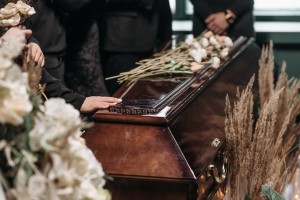
How do you want your life to be celebrated when you die?
Thinking about the death of a loved one or our own death is often a reach too far and is frequently ignored. However, it is worth thinking about what type of farewell you or your loved ones would like when you die so your wishes can be fulfilled. It will make it much easier for them when the time comes.
The first place to start is to find out what type of farewell you or your loved one envisage: a funeral, a memorial and a celebration of life. Planning the more delicate details is easier once you have decided on what type of ceremony you would like.
But, what is the difference between a funeral, a memorial and a celebration of life?
A funeral
A funeral is a more traditional service that most often follows an order of service. It can be held at a funeral home chapel, a place of worship or a location of your choice. The service is often led by a faith leader, an appointed celebrant by the funeral home director or another celebrant or person of your choosing.
Today funerals are usually held a few days after the death of your loved one, sometimes up to seven to 10 days. This is often determined by the type of farewell, and the distance family and friends have to travel. Some deceased are cremated within twenty-four hours for sanitary or faith-based reasons.
The first part of the farewell is the funeral service. It can be a religious or secular service with eulogies and tributes. The body is present at the service, most often in a closed casket, occasionally open.
If your loved one is being cremated, the celebrant will do a committal toward the end of the service. If a burial is part of the proceedings, the celebrant will do a committal grave-side.
It is customary to join family and friends for refreshments at the end of the funeral service; either before the journey to the cemetery/crematorium or afterwards.
A memorial
A memorial is a formal ceremony usually conducted after a burial or cremation. The deceased’s body is not present, but the ashes from a cremation are often present at the memorial.
Like a funeral, it follows an order service and can be a religious or secular service with eulogies and tributes.
As memorials are often held post-cremation, it gives you more time to prepare and hold the service at a time of your choice.
A memorial can be held in any location, and the service can be conducted by an ordained person, an independent celebrant or a lay person. Often a funeral director will organise the memorial with you.
A celebration of life
A celebration of life is a more casual farewell. Instead, the focus is on celebrating the person’s life by sharing happy memories of the loved one.
The celebration can be held anywhere and does not follow a set structure like a memorial or funeral. It can be held in their favourite park with guests wearing casual clothes and asked to share or listen to stories of the wonderful life of your loved one.
Like a memorial, the body is not present at a celebration of life, but the ashes could be brought and may be scattered or interred if planned ahead.
Celebrant Aoteraoa Funeral Celebrants
Celebrant Aoteraoa Funeral Celebrants can create and conduct services that reflect your family’s wishes and listen deeply with empathy during a time of loss. They are fully independent and, in most instances, can provide a secular or spiritual/faith blended farewell.
Members of Celebrants Aotearoa, who conduct funerals, are professional, experienced and abide by a code of ethics. They undertake ongoing professional development, and many have celebrant qualifications and training.
Find a CANZ Celebrant here to help you with the ceremony.
